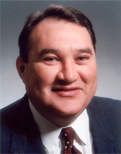© 2015 The Texas Lawbook.
By Natalie Posgate
(Sept. 24) – U.S. District Judge David Godbey ruled Wednesday that accounting firm BDO USA’s agreement to pay $40 million to victims in the R. Allen Stanford Ponzi scheme “is a fair settlement amount.”
The settlement is the largest recovery so far against third parties involved in Stanford’s Ponzi scheme, which defrauded approximately $7.5 billion from an estimated 20,000 investors around the world.
The average victim in the investment scheme will receive $1,500 as part of this agreement, according to court documents.
Lawyers appointed to recover money for the victims say the BDO settlement provides a precedent that will lead to additional settlements from other businesses that worked with Stanford and profited from his illegal activities.
Ed Valdespino, a lawyer representing the Official Stanford Investors Committee, said “many defendants have been waiting and watching to see if this case could be successfully settled” before they would ever consider settlement.

“It’s going to put money in the pockets of the investors,” added Valdespino, a partner in the San Antonio office of Strasburger & Price. “This will actually encourage additional settlements.”
Valdespino said the parties reached a settlement proposal about a year ago, but it took time to “work out the mechanics” of the settlement and allow investors ample opportunity to object to the settlement terms if they were dissatisfied. According to Valdespino, less than 1 percent of the investors objected to the settlement.
Judge Godbey rejected claims by the objectors that $40 million is not nearly enough in a financial fraud that cost investors $7 billion.
“While the court notes the objectors’ argument that the settlement amount represents a small fraction of the investors’ losses, the court also gives weight to the fact that this amount was not settled on in in a vacuum,” the Dallas federal judge wrote in his order.
The original lawsuit against BDO claimed the Chicago-based accounting firm’s “cozy relationship” with Stanford contributed to the fraud.
Stanford, a former Houston investment banker, was convicted in 2012 of wire and mail fraud and is serving a 110-year prison sentence. The U.S. Securities and Exchange Commission obtained a $6.7 billion disgorgement order against his financial institution, Stanford International Bank.
BDO claimed in court documents that it never knew about and was never involved in any of Stanford’s illegal activities.
In exchange for the $40 million that BDO will pay to the receivership estate, BDO will receive “a global release of all past, present and future claims against BDO arising from its relationship with Stanford,” the order says.
Dallas lawyer Karl Dial, who led the case for BDO, could not be reached for comment.
BDO spokesman Jerry Walsh said the accounting firm is making no admission of any wrongdoing with the settlement.
“BDO Seidman was never the auditor of Stanford International Bank, the entity where Robert Allen Stanford committed his fraud,” the statement says. “BDO audited an affiliated company whose financial statements are not alleged by plaintiffs to have contained any material misstatements. However, after four years of litigation and the likelihood of more to come, this settlement makes the most sense for our partnership given our relevant insurance coverage and the costs, as well as the loss of time and energy, associated with continuing this case.”
Dallas attorney Ralph Janvey was appointed as the Stanford Financial receiver in 2009. The receivership has distributed $47 million as of March 31, 2015 to victims who have filed claims, according to its most recent filing from this April.
In addition to Valdespino, the investors committee’s legal team included San Antonio attorney Ed Snyder of Castillo Snyder and Dallas attorney Doug Buncher of Neligan Foley.
Dial, the managing partner of DLA Piper’s Dallas office, received assistance defending BDO from firm colleagues Larry Wojcik and James Nelson.
© 2014 The Texas Lawbook. Content of The Texas Lawbook is controlled and protected by specific licensing agreements with our subscribers and under federal copyright laws. Any distribution of this content without the consent of The Texas Lawbook is prohibited.
If you see any inaccuracy in any article in The Texas Lawbook, please contact us. Our goal is content that is 100% true and accurate. Thank you.
